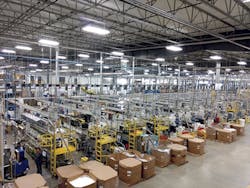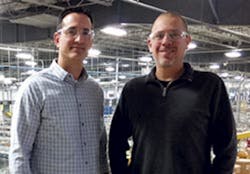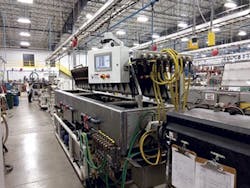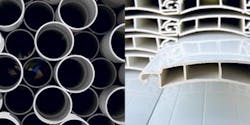Flexibility is not a word that often comes to mind when describing an extrusion plant. But Reschcor, a family-owned extruder, has found that being flexible with its extrusion lines can be a significant business advantage.
The Bristol, Ind., company opened its current manufacturing plant in 2015, adding production lines, manufacturing space and room for growth.
The plant incorporates 18 extrusion lines. What sets Reschcor apart from many of its competitors, according to company officials, is the fact each of those production lines is designed to work with coextruders in addition to the primary extruders.
"The way we set the plant up is somewhat unique where we could do co- or tri-extrusion on any line in the whole facility, which is probably something that would set us apart," VP Jim Reschly said.
The flexibility of connecting additional extruders to a production line allows for combining two or three materials into the same profile.
Reschor's building, which includes its manufacturing plant and offices, measures 88,000 square feet. That provides room for its extrusion lines to produce custom profiles for a variety of markets. Profiles made at the plant are used in a variety of products and markets, including agriculture, appliances, building and construction, commercial refrigeration, consumer goods, decking and railings, electrical, fencing, industrial, lawn and garden, lighting, medical, signs and displays, safety devices, specialty pipe, windows and doors.
"We focus on custom profile, tubing and specialty pipe for a wide range of industries," said President Tom Reschly, who with Jim Reschly, his brother, co-owns the business. "Due to our focus and experience on extrusion, we have been successful in serving a wide array of different industries. … Basically, we don't pigeonhole ourselves into a particular market or industry because we feel like our experience in the extrusion process and the materials we are familiar with have applications in a lot of different markets and industries, so we try not to limit ourselves."
Though not limited to a certain product or industry, the tri-extrusion process is especially appropriate for making window profiles that have interior and exterior caps of different colors. A common application would be to run a standard, general-purpose substrate material with a thin layer of weather-resistant material on the exterior surface for maintenance-free applications and different colors.
Reschcor is equipped to make products from a variety of materials, including cellular, flexible and rigid PVC, wood-plastic composite, high-impact PS, crystal PS, HDPE, LDPE, ABS, acrylonitrile styrene acrylate, acrylic, PC, PP, TPE and TPU.
It has a mixture of both single- and twin-screw extruders ranging in size from 1.5 inches to 3.5 inches in diameter. About half the 18 extruders are twin-screw, Tom Reschly said.KraussMaffei Berstorff makes the twin-screw extruders, and American Kuhne, Davis-Standard and Battenfeld-Cincinnati supplied the single-screw machines.
Adding twin-screw extruders in 2002 marked a turning point in the history of the company.
"When we added twin-screw extruders to our equipment mix, it allowed us to do higher volumes, as well as process dry blends and not just pellets," Tom Reschly said. "We utilize a full range of singles and twin-screws just so if we are approached by a customer, we can fulfill all their profile needs."
He said the company makes products designed according to its customers' specifications, as well as its own products that can then be sold to customers to market under their own brands.
"We have several proprietary products in the [recreational vehicle], building and construction, and lawn and garden industries," he said. "On average, we serve approximately 170 clients across 15 industries [annually]."
In addition to the primary extruders, the company has portable coextruders that can be connected to any of the extrusion lines and can combine multiple compatible materials in the same die profile.
Reschcor remains loyal to its handful of extruder vendors, Tom Reschly said.
"When we find a machine that works well for us, and, obviously, we're treated well by that OEM, we stick with them," he said. "But we also have custom needs. Finding a company that is willing to add this feature or change the way we do a certain component of that machine and offer the same flexibility that we like to offer to our customers helps us partner with the right vendors."
After a profile leaves the extruder, it enters either a vacuum calibration table or a flood/spray cooling tank for cooling.
"It's accomplishing the same thing, really, with two different types of cooling," Jim Reschly said. "The calibration table methods were probably more of a European design."
"They are more typical in window profile, where tanks are more typically found in single- wall profile and pipe," Tom Reschly added.
Reschcor's calibration tables and cooling tanks are custom-built to the company's specifications.
"It's kind of a collaborative effort with several different manufacturers," Tom Reschly said.
After cooling, Reschcor has both belt and cleat pullers to remove the profiles. Some are built by Novatec, others by Conair and some are custom-built.
"Beyond the pullers is where we get very customized and do a lot of different things," Jim Reschly said. "We do winding, and we do punching, and the cut-off and the haul-off."
The processes are mostly automated and carried out with equipment designed by Reschcor and custom-constructed. For example, if the company is manufacturing an edge band or a molding for furniture for the RV industry, it can wind the final product onto corrugated cardboard or wooden reels or spools.
Reschcor also uses in-line ultrasonic measurement systems by Beta LaserMike and laser measurement systems by Starrett to ensure finished products meet size specifications.The company employs an engineering manager and a full-time automation engineer who oversee integration of automation into the manufacturing process.
"We try to do as much in-line fabrication as we can, whether that is punching, notching, drilling, applying adhesives, applying decorating profiles, different finishes and embossing," Tom Reschly said. "We have done a lot of in-line value-add-on parts for customers, and a lot can be automated."
Reschcor currently uses its own custom- designed materials-handling equipment for performing automated functions instead of robots, but that could change as the role of automation in the workplace grows.
"I see automation playing a bigger role in the future," Jim Reschly said. "I could see a transition into robotics or the addition of robotics where applicable."
Auxiliary equipment
Department leaders identify and prioritize equipment and machinery needs, Tom Reschly said.
"Our plant utilizes state-of-the-art auxiliary process equipment systems," he said. "Reschcor's material handling, compressed air, electrical and chilled water systems were custom-designed for our operation. In addition, Reschcor utilizes high bay racking with a bar-code warehouse management system in order to facilitate single pick-and-place organization of hundreds of raw materials and colorants used on a regular basis."
Reschcor's warehouse is stocked using Raymond-brand Swing-Reach trucks, which move autonomously throughout the plant by following a cable embedded in the floor. An operator is required to use the forklift when placing or removing materials from shelving in the warehouse. The units are powered by rechargeable batteries.
Once the resin arrives at the plant, a Coperion K-Tron central vacuum loading system delivers the resin from a central location to individual extruder lines.
For resin requiring drying, the company uses two portable Matsui MJ5-i dryers, along with a few older Conair models.
When blending is required, Reschcor uses four-component gravimetric blending units sold by TSM Control Systems. If liquid colorant needs to be introduced, the company uses a ColorMatrix FlexCart liquid-metering system.
Temptek provided Reschcor with a custom- designed central water chiller that services the entire plant.
Gardner Denver supplied the plant's air compressors.
Custom dies and molds
One factor setting Reschcor apart is that in 2012 the company added its own toolroom, allowing it to design and build custom dies and molds instead of buying them from a vendor.
"Prior to that, we were using outside mold and die builders or tool shops," Tom Reschly said. "As part of our engineering services, if a customer comes to us, they generally have a two-dimensional part drawing, or they might even have actual prototypes of the part they want built. We then design the tool for extrusion and build it in-house."
The toolroom is equipped with Fanuc-brand wire electrical discharge machines [EDMs], as well as CNC mills and CNC lathes from other manufacturers.
The addition of the toolroom means that Reschcor also can build or repair some of its own custom equipment, Tom Reschly said.
Company history
Tom and Jim Reschly's father was one of the founders when Reschcor launched its business in 1982 as Omega Plastics Corp. The company started in a small building in Elkhart, Ind., with only two extrusion lines and a small list of clients. It grew quickly to three plants and about 18 extrusion lines over the next 15 years.
In 2012, the company rebranded as Reschcor.
In 2015, Reschcor relocated to its current site in Bristol. The current building replaced what had been 51,000 square feet of manufacturing and office space. It sits on 30 acres of land and has space for future development.
"Everything we designed here when building this building was designed for full development of about 150,000 square feet," Tom Reschly said. "Our next expansion will be here. … The plan for expansion and ultimate construction and move to a new facility was a five-year process. After a thorough search of both existing buildings and sites for possible construction, the Bristol site was chosen due to its location [close] to the Indiana Toll Road, rail access and proximity to our existing workforce, who are instrumental in our daily operations of the facility."
Reschcor employs 125 workers and the plant operates 24 hours per day, seven days a week.
Bruce Geiselman, senior staff reporter
Contact:
Reschcor Inc., Bristol, Ind., 574-295-2413, www.reschcor.com
About the Author
Bruce Geiselman
Senior Staff Reporter Bruce Geiselman covers extrusion, blow molding, additive manufacturing, automation and end markets including automotive and packaging. He also writes features, including In Other Words and Problem Solved, for Plastics Machinery & Manufacturing, Plastics Recycling and The Journal of Blow Molding. He has extensive experience in daily and magazine journalism.





